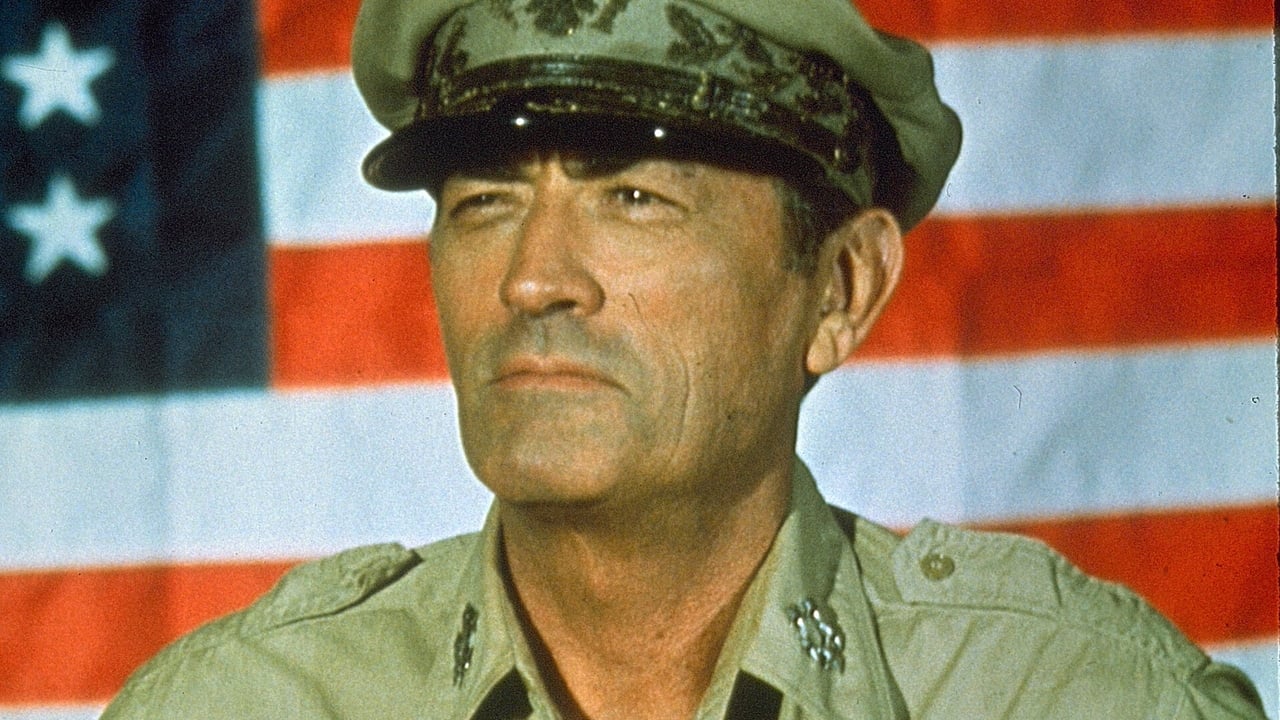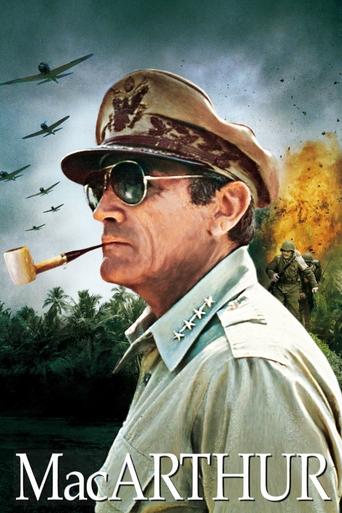Exoticalot
People are voting emotionally.
Dorathen
Better Late Then Never
Dynamixor
The performances transcend the film's tropes, grounding it in characters that feel more complete than this subgenre often produces.
Haven Kaycee
It is encouraging that the film ends so strongly.Otherwise, it wouldn't have been a particularly memorable film
John T. Ryan
FOLLOWING ON THE heels of the successes of Frank J. Schaffner's epic story of "Old Blood & Guts" in PATTON (20th Century-Fox, 1970), one could easily come to the conclusion that MAC ARTHUR (Universal, 1977) was imitating a Hollywood trend. That was our mistaken notion up until very recently. We finally screened the movie and discovered our folly.ADMITTEDLY THERE WERE a few carryovers from the George C. Scott tour-de-force (most notably Producer Frank McCarthy and the original score by Composer Jerry Goldsmith), but that's about how far it goes. The two films bore little in common outside of their both belonging to the same category of Epic Military Biographies. THE PROBLEMS IN storytelling called for a different approach for MAC ARTHUR as the period of time was much longer and more diverse than was the earlier film. In PATTON, we follow about 3 years in a career that lasted over 35 years. It begins with his assuming Command of II Corps following the disastrous Battle of Kasserine Pass in Tunisia. It ends with the aftermath of V.E. Day; ending the War in Europe.THE TIMELINE OF the production of MAC ARTHUR called for the earliest days of the War in the Pacific, with General Douglas Mac Arthur's being the Supreme Allied Commander in the Philippines. It extends its timeline through the end of the War and up to the Korean War of 1950-53.IT WAS THE conduct of the General in disregarding the orders from President Harry S. Truman that led to his being demoted and brought home; albeit to great heaping of a Hero's welcome. (THat included an address before a joint session of the Senate and the House of Representatives.*)OTHER THAN THESE above mentioned factors, the film MAC ARTHUR was a first class, non copycat production that stands on its own two feet. Its filming locations, military equipment & personnel were very convincing and accurate. The Battle scenes are convincing and did expertly weave in some newsreel footage. The production team really made the viewer feel that he was there. WE MUST BE sure to pay proper homage and respect to the ensemble cast for acting they provided, that includes all support people. As for the lead role of Douglass Mac Arthur, he did his best to "become" the man he was portraying. The inclusion of not one but two Presidents was handled with the greatest skill. Both Dan O'Herlihy (Franklin D. Roosevelt) and Ed Flanders (Harry S. Truman) filled out their roles to the ultimate level.NOTE * We feel a particular fondness for this film as this writer (John T. Ryan) as a preschool youngster of about 4 1/2 years old, witnessed the famous "Old soldiers never die, they just fade away !" speech of April 19, 1951. It was on our recently purchased Du Mont Television set. My Mother (Bertha Fuerst Ryan) explained who and what the General was to me. It's one of my earliest recollections and very vivid over 67 years later. Thanks Ma !
JoeytheBrit
All nations have their heroes, but few of them are of interest to residents of other countries, and such is the case with General MacArthur. The name's familiar, but the details of his life are not, and to be honest I still don't know a lot more about the man MacArthur than I did before watching this over-long drama, which focuses on only a decade or so of his life. Peck plays the General in his usual wooden style, when you'd expect the man to be a little more larger than life. He's depicted as a supreme strategist who clashes with his President during the Korean war, and while the film appears to sympathise with him, it also portrays him as something of an egotist, obliquely comparing himself to the likes of Alexander, Napoleon and Caesar (at one point we actually see him wrapped in towels, toga-style). We learn virtually nothing of his personal life, nor of the earlier events in his life which surely must have shaped him into becoming the finished article we see on the screen.
Nazi_Fighter_David
The film transported everyone back to October 20, 1944 where we seemed to be part of the great Philippine 'I Shall Return' landing scene… It was on that Leyte shore where General MacArthur reaped his fame… Above all, Gregory Peck triumphed in his portrayal of the great general… It is the stride, the set of the shoulders, the intensity… It's what both men have had in common: intensity, total absorption, devotion… With MacArthur it was for the military… With Peck it was for the challenge of acting… An Academy Award winner for "To Kill a Mockinbird", an Oscar nominee for "Keys to the Kingdom", "The Yearling", "Gentleman's Agreement", and "Twelve O'Clock High"—he has played everything from an apparently homicidal amnesiac to a crusading journalist; from a troubled gunfighter to an obsessed attorney; from biblical David to Captain Horatio Hornblower… He has brought to them all his own unique insight, his character, his sincerity, warmth and love, and especially, his humor… There is a scene where 'MacArthur' stands on deck with the 'President of the Philippines.' We can hear the dialogue: "General, I hope the water isn't too deep," says the 'President,' "because my people will find out I can't swim." Then come Peck's sonorous voice: "And my people are going to find that I can't walk on water!" As "MacArthur," Peck once again justified his reputation as a giant in the film industry… Through him we felt MacArthur's emotions: we knew his anger, his happiness and we understood the relationship with his whole family
grafspee
No matter what you have to say about MacArthur, critical or otherwise, he shaped events in the Pacific theater of World War II to give him a part of history in the twentieth century. In this well done production with Gregory Peck in the leading role, he gives a candid performance of the flamboyant and publicity seeking authoritative General who turned earlier defeat into ultimate victory. His great speech on arrival from the Phillipines, by train at Spencer Street Station in Melbourne Australia in March 1942 incorporating those famous words - " I came through and I shall return" - was an inspiration to many Australians during their darkest hour.From the time of his arrival in our country he quickly abandoned the idea of defending any mainland invasion by the Japanese and decided on an offensive in New Guinea as a counter attack. Peck is perfect in the role of the self minded MacArthur doggedly pursuing the Japanese back to their homeland while arguing with his own superiors, including U.S. President Franklin D. Roosevelt over his earlier promise to liberate the Phillipines, which was planned to be bypassed. After the Japanese surrender, MacArthur becomes virtual ruler of Japan modifying old customs and instituting sweeping land reforms. His authority remained absolute until the outbreak of the Korean War in 1950, when he clashed with new U.S. President Harry Truman over his successful campaign against the North Koreans and his intention to take on their Communist Chinese backers. Truman, wanting to avoid another world conflict, relieves MacArthur of his command and he is recalled home. Peck is magnificent with his captivating speech before a band of West Point recruits where he details his life and closes the movie with that famous caption " Old soldiers never die - they just fade away". This movie is a must for the younger generation of this world, to know that today's freedom was the result of the sacrifices made by their forbears.To add a final footnote my mother worked at Archerfield aerodrome in Brisbane in 1942 with her sister where they were employed as aircraft riveter's being responsible for the repair of the fuselage of damaged U.S. Aircraft used during the defense of our country during World War 2. She told me well before her death in March 2004 how she took her limited time off from work to travel to central Brisbane just to watch General MacArthur walk down Queen Street from his home base at Lennons Hotel to the AMP building in Edward Street where he had his headquarters.She said what a fine figure he cut, tall and handsome, and full of confidence in his goal of supreme victory. Her expectations in the faith of this great American General were ultimately justified. We are a free country today for the contribution of his great military expertise in the time of our greatest need.

